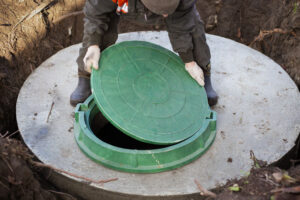 How much do you know about septic systems versus public sewers? Both deal with wastewater. The major difference between the two is that septic systems deal with wastewater on site while public sewers take the wastewater far away to a treatment plant somewhere in your municipality.
How much do you know about septic systems versus public sewers? Both deal with wastewater. The major difference between the two is that septic systems deal with wastewater on site while public sewers take the wastewater far away to a treatment plant somewhere in your municipality.
Sewers
If you live “out in the country, far from the city,” then chances are good that you have a septic system on your property, whereas almost all modern cities utilize public sewers as “the norm.”
If your house or building is connected to the local public sewer system, then clean water comes into your place in one set of pipes, and dirty water goes out of your place in another set of pipes. The drains in your place are connected to one big pipe that takes the wastewater away, underground. Sewer pipes can run for miles and miles, all heading toward the local water treatment plant where wastewater is treated so it can be used again. Contaminants are removed, and eventually wastewater is clean enough to be drinkable again– an amazing feat, really!
Septic Systems
Septic systems, on the other hand, are on your property such that your wastewater generally moves from a pipe out of the building, underground, and into a septic tank buried in the ground nearby. In this tank, wastewater gets naturally “broken down” such that contaminants are safely eliminated over time. Thanks to science and biology, the wastewater is essentially cleaned and returned back to the land on site without harming any nearby groundwater.
If you have a septic system, you should know that the tank has three layers: scum, wastewater and sludge. Suffice it to say that sometimes people get their tanks pumped out in order to remove scum and sludge.
In the Carolinas, when you need your septic tank pumped out, or you have any questions about septic systems, call Carolina Septic Pro at 980-500-1022.
